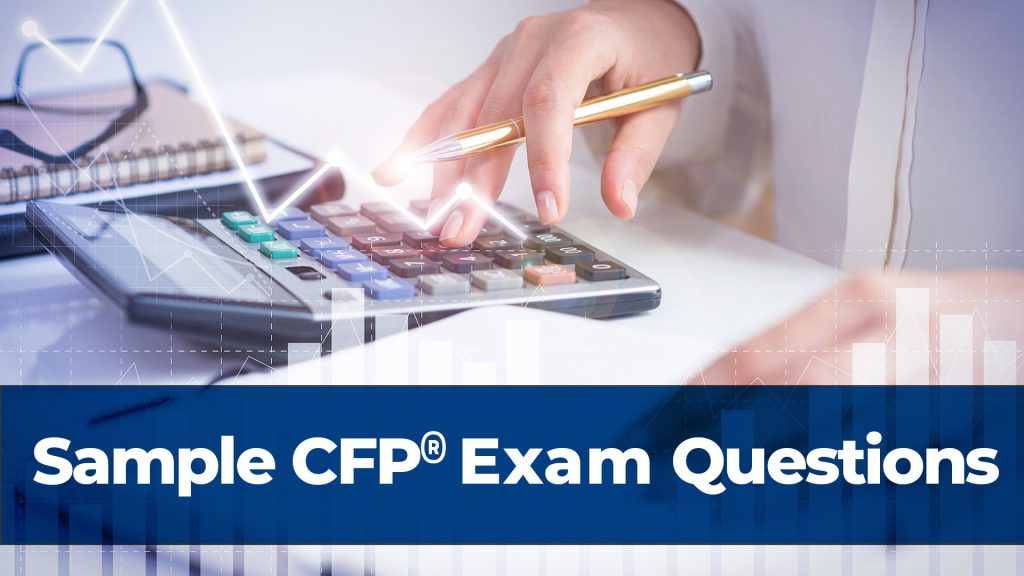Free Online CFP® Exam Practice Questions – Estate Planning

Appearing for the CFP® Exam without going through the practice questions is often the cause for failure. Although you may end up clearing the CFP® Exam satisfactorily, it is usually a risky prospect to consider. Therefore, aspirants are advised to go through the important CFP® Exam practice questions to make themselves familiar with the question paper. Even though some questions may seem quite dynamic, you can always look out for a pattern.
CFP® Exam prep by Achieve presents you ten free practice questions to help you get exam ready. Solve these questions from the Estate Planning subject and know where you stand.
Q1. If the alternate valuation date is chosen, how long after the date of death may assets in a decedent’s gross estate be evaluated at their fair market value?
A. 2 months
B.. 6 months
C. 1 year
D. 2 years
Click here for answer and detailed explanation.
Q2. Which of the following is true for completed gifts of a present interest?
A. A tax credits
B. The gift tax annual exclusion
C. Tax exemption
D. Deferred tax consideration
Click here for answer and detailed explanation.
Q3. Real property is probated according to the law of:
A. Situs
| B. Ab initio |
C. Actus reus
D. Nota bene
Click here for answer and detailed explanation.
Q4. How long is it possible to make additional property payments to a CRUT?
A. Throughout the trust’s existence
B. Within the first 5 years of the trust
| C. Within the first 8 years of the trust |
D. Within the first 10 years of the trust
Click here for answer and detailed explanation.
Q5. A single will signed by two testators is known as which of the following?
A. A joint will
B. A mutual will
C. A living will
D. A pour-over will
Click here for answer and detailed explanation.
Q6. IRS Form 706 is used for:
A. Education expenses
B. Federal estate tax returns
C. Filing gift taxes
D. Documenting capital gains and losses
Click here for answer and detailed explanation.
Q7. Wade is the beneficiary of a life insurance policy worth $2 million. His wife, Tracey, is named as the policy’s owner, and his 20-year-old daughter, Rose, is named as the beneficiary. Which of the following will happen if Wade dies?
A. Tracey will make an indirect gift of $2 million from Wade’s policy to Rose
B. Rose will receive the insurance death benefits, and no gift will be made.
C. Tracey will receive the insurance death benefits, and no gift will be made.
D. Wade will make an indirect gift of $2 million from his policy to Rose
Click here for answer and detailed explanation.
Q8. How is the taxable estate calculated?
A. Adding adjusted taxable gifts to the adjusted gross estate
B. Subtracting marital and charitable deductions from the adjusted gross estate
C. Multiplying the gross estate by the estate tax rate
D. Subtracting administrative and funeral costs from the gross estate
Click here for answer and detailed explanation.
Q9. A testator must do the following to modify a will:
A. Write the amendments down anywhere
B. Verbally tell an attorney
C. Tell someone
D. Execute a codicil
Click here for answer and detailed explanation.
Q10. Which of the following is exempt from gift tax and GST (generation-skipping transfer) tax?
A. Books and supplies for grandchildren
B. Basic expenses, such as food and medical care, for beneficiaries
C. Gifts under $24,000
D. Transfers for qualified medical and tuition payments
Click here for answer and detailed explanation.
Practicing CFP® exam questions is the most efficient way to clear this competitive exam. Almost all the students preparing for the exam should solve CFP® exam practice questions to give their best shot in the exam. Subscribe to CFP® Exam Prep by Achieve to get valuable insights into the lay of the land.